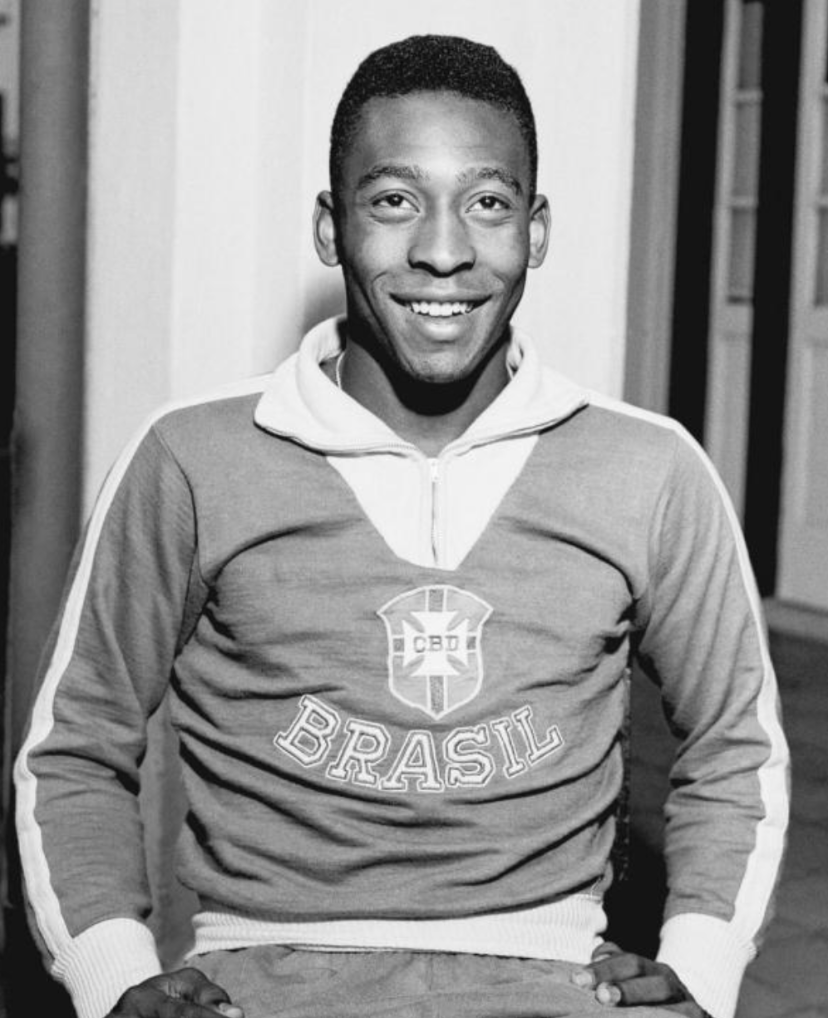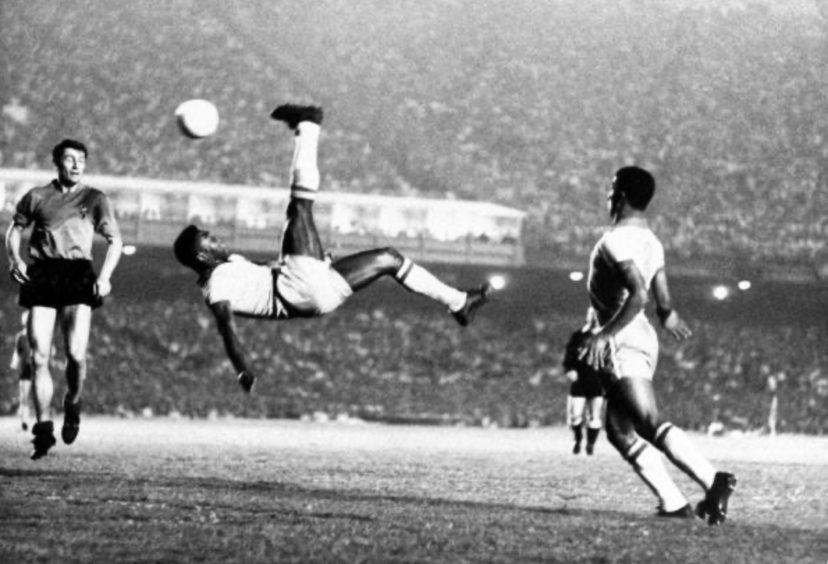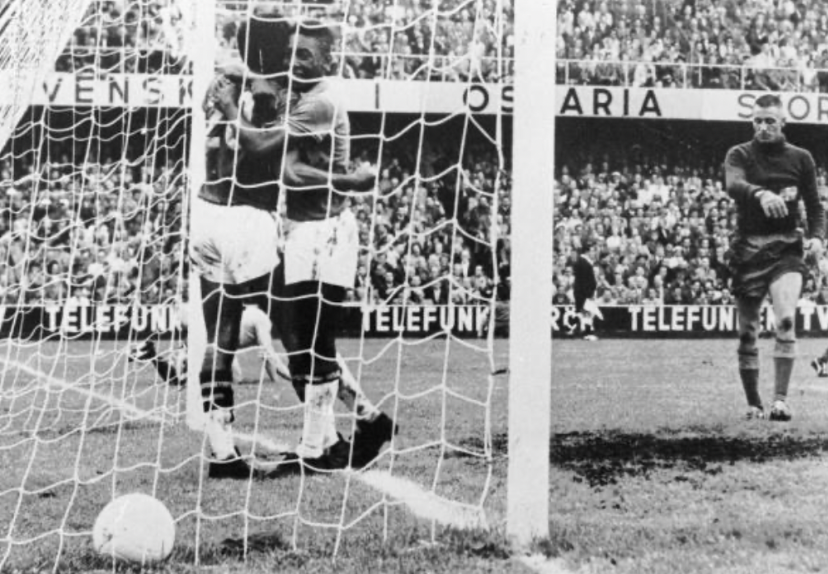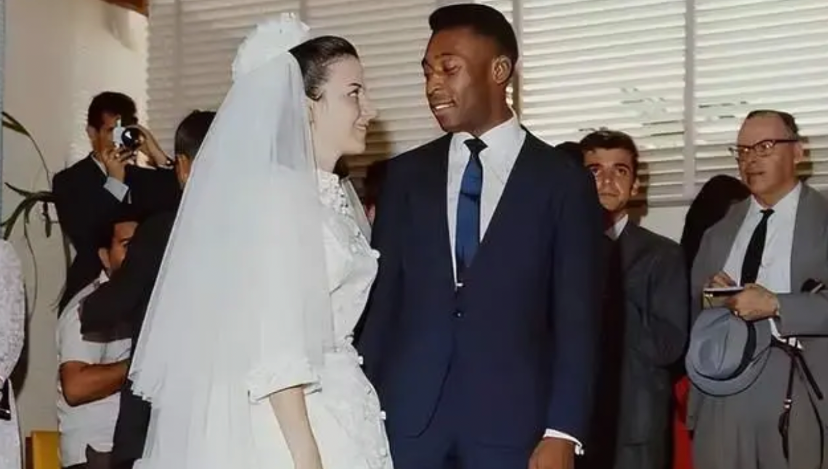King of the beautiful game
美丽运动之王者
From The Economist Jan.7-13,2023
摘自2023年1月7日《经济学人》(美国)
Edson Arantes do Nascimento, aka Pelé, footballer, died on December 29th, aged 82.
球王贝利,爱迪生·阿兰特斯·多·纳西门托,于十一月29日去世,享年82岁。

He was just a boy, only 17. Yet in the World Cup final of 1958 Ed son Arantes do Nascimento, better known as Pelé, showed the poise and supreme skill that would mark his career. As Brazil led Sweden, the hosts, by two goals to one he received a high pass in the penalty area. With a defender on his shoulder, he caught the ball on his chest, took one pace and flipped the ball high over an other defender before running to meet it and driving an unstoppa ble volley low into the net.
在1958年世界杯决赛时,年仅十七岁的男孩爱迪生·阿兰特斯·多·纳西门托,贝利,上演了一幕他足球生涯中标志性的绝杀。在巴西队二比一领先东道主瑞典队时,他在禁区接到了一个高传球。在有一名防守球员在肩上的情况下,他胸部停球,跨前一步,将球高高跳过另外一名防守球员,然后飞奔上前接球,以不可阻挡之势,低空抽射入网。

Though he said so himself, it was a nice goal. After looping in another, realising they were about to win the whole tournament,he passed out with emotion on the pitch. He felt he had achieved everything, all his dreams come true—even to a fling with a blonde, blue eyed Swedish girl who was crazy for this little black Crioulo, as he loved to call himself.
他自称这是一粒好球。再次进球之后,意识到他们将赢得整个比赛之后,他兴奋得晕倒在了球场上。他感觉自己获得了一切,所有的梦想都已成真——他甚至与一位金发碧眼的瑞典姑娘约会,后者对这位喜欢自称为“西班牙裔拉丁美洲黑小伙”的他情有独钟。
This was only the first of three World Cups he won, more than any other player. It might have been four, but in 1966 the Bulgarian and Portuguese defenders kicked him to pieces, the referees didn’t protect him and Brazil, he thought, were badly prepared anyway,so they crashed out.
这只是他超过所有其他球员,所赢得的三届世界杯冠军中的第一个。本来有可能是四届世界杯冠军的,但在1966年,保加利亚队和葡萄牙队的防守队员将他踢得遍体鳞伤,裁判员都不帮他说话。他认为,巴西队严重准备不足。就这样,他们被淘汰出局。

Three Argentines—Alfredo Di Stéfano, Diego Maradona and Lionel Messi—all had their claims to be the world’s greatest foot baller. But he held the world record for goals, 1,279 in 1,363 match es, and that was unlikely to be surpassed. Even a goal he didn’t ac tually score, against England in the 1970 World Cup, became fam ous, because few—including him—could work out how Gordon Banks had managed to save it. Ever confident, he shouted “Goal!”as he launched his header. It was scooped over the bar.
阿尔弗雷多·迪·斯蒂法诺、迭戈·马拉多纳和利昂内尔·梅西三位阿根廷人都被称为世界最伟大的球星。但是贝利拥有1363场比赛进1279球、几乎无法超越的世界纪录。甚至在1970年与英格兰队的比赛中,他没有进的那粒球也出名了,因为几乎没人,连贝利本人也没有料到戈登·班克斯能够成功扑救那粒球。他顶出这粒头球时,信心满满地喊到:“进球!”,但球被扑出了横梁。
As a forward he was not that tall, but he was strong, fast and had thighs as thick as his waist. He could read the game like a book,and control the ball as if it was drawn to him like a magnet. He could also tell exactly where he was needed, and when, and what the opposition might have in mind to try to block him. All this seemed to make him a natural captain, but he never wanted that role officially. He would just show the team his best moves, orga nising by example, and was happy to provide the killer pass for others to finish.
作为前锋,他不算高,但够强、够快,拥有与腰身一样粗的大腿。他观察赛势就象在读一本书那样,并且能够象磁铁一样牢牢控球。他还能够准确判断场上哪里、什么时候需要他,以及哪个防守球员想拦截他。所有这些都令他自然而然地成为场上队长,但他对队长一职毫不在意。他只是向球队展示他的最佳表现和组织垂范,并且乐意为其他队员作助攻,提供绝杀妙传。
Dribbling was his great skill, flummoxing defenders with feints and sudden stops and starts. He could shoot for goal power fully with either foot and despite his height, or lack of it, was a spring heeled header of the ball. He jumped so easily over Tarcisio Burgnich, the Italian marking him in the 1970 World Cup final,that Burgnich doubted he was flesh and bone at all. Then he scored the first goal. He knew he was the best player in that tournament and, with the next World Cup four years away, he declared he wouldn’t play any more.
他球技的大过人处在于盘带。他善于用假动作、突然停止和启动迷惑对手。他双脚都能够大力射门。他虽然个子并不高,甚至说没有身高优势,但却是鱼跃冲顶头球手。他轻而易举地跃过塔尔西斯奥·布尔尼什,以至于布尔尼什甚至怀疑他不是血肉之躯,这位意大利人称他是1970年世界杯决赛的标志人物。这样,他踢进了第一个球。明白自己是那届联赛的最佳球员之后,虽然距离下一届世界杯还有四年之遥,他就宣布不再踢球了。
He retired, he felt, at his best, and before football stopped being fun. His World Cup goal at 17 had been nothing but joy, no nerves,no responsibility, but his thousandth goal, in 1969 from a penalty,was completely different. His legs shook, the whole of the Maraca nã stadium was yelling, and he was suddenly crushed by the thought that he, three times world champion, most famous foot baller, could not miss this. He had never felt pressure like it.
他挂靴了。他感觉自己是在状态最好的时候隐退的,这个时候足球还好玩儿。他十七岁的世界杯进球纯粹是快乐,没有紧张,没有责任,但在1969年他获得自己的第一千粒进球的点球时,情况却完全不同了。他双腿发抖,马拉卡纳球场全场欢呼,他突然闪过一个念头,作为一个三次世界冠军获得者和最著名的足球队员,自己不能罚失这粒点球。他感到压力从来没有这么大过。
Nor had he imagined he would face it. He was born in poverty in a town in the south west of Minas Gerais state; his great grand parents had been slaves. His first trainer was his father, a profes sional footballer whose career at Vasco da Gama was ended early by injury. His mother preferred him to be unhurt and earning proper money. Even a ball was too costly: he played with anything roughly round, socks stuffed with paper, mangoes or a bundle of rags. His lifetime love took root then, and never left him.The nick name “Pelé”, a classmate’s tease, annoyed him at first (“Edson” was more serious, after Thomas Edison), but he liked it better when he learnt it meant “miracle” in Hebrew. And miracles followed. At only 15 he was snapped up by Santos, his first professional club.Largely because of him it became the best team in the world in the early 1960s, winning two Intercontinental Cups.
他也没有想过如何来面对压力。他出生在米纳斯吉拉斯州西南部小镇贫困家庭,他的曾祖父母都当过奴隶。他的足球教练是他的父亲——一位专业的足球队员,因为伤病早早地结束了在达·伽马球队的足球生涯。他的母亲希望他不受伤,正当挣钱。甚或足球都太过昂贵了:他用塞满纸、芒果或破布条的袜子等的任何差不多圆的东西来踢。这样,他一生所爱就此扎下了根,再没有离开过他。“贝利”是一个同学给他取的绰号,最初让他感觉不快(“爱迪生”这个名字在“托马斯·爱迪生”取名之后,则严肃得多),但在知道“贝利”的希伯来语意思是奇迹之后,他就喜欢上了这个名字。奇迹真的随之而来。十五岁时,他被自己第一支职业俱乐部的桑托斯足球队看中。主要是因为他的出色表现,该队赢得了两次洲际足球杯赛,成为上世纪六十年代早期世界最佳球队。
Several big European clubs begged him to join them: Real Ma drid, ACMilan, Bayern Munich. But Santos and Brazil’s govern ment refused a transfer. Besides, life was so nice at Santos that he didn’t want to change, and he went on playing for the club long after he left the international game. He played before football was a global business: half his career was in black and white. In today’s game he would have been a billionaire. As it was, he had a sharp eye for money in deals off the pitch. At 34 he came out of retire ment to help launch “soccer” in the United States, joining the NewYork Cosmos because, he said, Henry Kissinger persuaded him. By 1977, when his tenure ended, he was being called “O Rei”, “The King”—the very name that the playwright Nelson Rodrigues, a to wering figure in Brazil, had given him years before when he had first seen him play for Santos.
皇家马德里、AC米兰和拜仁慕尼黑等几个欧洲大足球俱乐部争相请他加盟。但是桑托斯俱乐部和巴西政府拒绝他转会。而且,在桑托斯俱乐部生活如此美好,他并没有转会的想法,而且在离开国际大赛很长一段时间之后,他仍然在继续为该俱乐部踢球效力。他是在足球成为一项全球产业之前踢球:他职业生涯的一半是黑白足球。如果是在当今足坛,他早已成为亿万富翁。事实正是如此,在球场外,他商业眼光敏锐。他三十四岁时复出加入纽约宇宙队,在美国帮助发展“足球”运动,他说,这是由于亨利·基辛格的劝说。1977年,任期结束后,他被冠以“上帝”和“球王”的美誉——这是几年前巴西著名剧作家内尔松·罗德里格斯在第一次观看贝利为桑托斯俱乐部踢球后给他取的。

Santos was always close to his heart; as was Vasco, where his fa ther had taken him as a toddler to watch training sessions. In 1994 he even accepted a job as sports minister in the democratic gov ernment of Fernando Henrique Cardoso. He piloted a law to clean up Brazilian club football, but it was neutered in the Congress,where a powerful lobby defended the corrupt state of things as they were. The activities of that bunch of crooks and the poverty he saw in his rich country often made him cry. His life off the pitch was complicated, with three marriages and at least seven children, one of whom—a daughter born of an affair with a cleaner—he refused for a long time to recognise.Women aside, though, he kept his life simple. He hoped to pass as an ordinary guy at airports, and never used the red diplomatic passport President Lula gave him. His way of winding down was to go fishing or to play pião with the wooden top he always carried,spinning it on his palm as long as he could. He was never an activ ist; just by being himself, he embodied black dignity. And he rev elled in the beautiful game he played. His one regret was that he had never scored in the World Cup with a bicycle kick.
桑托斯俱乐部一直是他的钟爱——正如瓦斯科在他心中的地位一样,他的父亲在他还在蹒跚学步的时候就带他去那里观看训练赛。1994年,他甚至接任了总统费尔南多·恩里克·卡多佐民主政府的体育部长一职。他引领了一部清除巴西俱乐部足球腐败问题的立法,但没有通过,腐败问题得到国会里一批当权政治说客的保护,没有解决。骗子们的行径和在他富裕国家所看到的贫困常常令他饮泣。他球场以外的生活是复杂的:他有三段婚姻,至少七个孩子,其中一个女儿是他与一个保姆所生——他长时间拒绝认领。但除了女人以外,他生活简朴。他希望自己象一个普通人那样过飞机场,而不是使用卢拉总统给他签发的红色外交护照。他放松的方式是垂钓,或者用经常带在身边的一个木陀螺放在手掌中玩旋,能旋多久就转多久。他不是一个活动家,他只做他自己,他代表着黑人的尊贵。他纵情于他从事的美丽运动。他唯一的遗憾是没有在世界杯中用自行车式踢法进球。
追光译,2023年1月18日
扫码参与评论与作者和更多用户交互